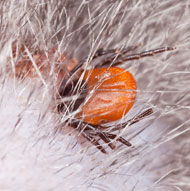Scientists discover how ticks protect themselves from Lyme disease

Ticks have an entirely different immune system from other insects.
How ticks can survive whilst harbouring bacteria, viruses and parasites has been unravelled by scientists at the University of Maryland.
The research, published in the journal Nature Communications, reveals that ticks have an entirely different immune system from other insects.
For a long time, scientists believed that the tick immune system worked in a similar way to that of mosquitoes and flies. But the researchers found that, in evolutionary terms, ticks are as far removed from insects, as humans are from fish.
"Although the two bugs are seemingly alike, it turns out that the immune system of ticks is quite distinct from insects. Our discovery clarifies the ins-and-outs of how the tick immune system fights bacteria," said senior author Dr Joao Pedra.
The reasearchers first observed that ticks do not possess crucial genes for a proper immune response. This led them to discover a new pathway that recognises three distinct bacteria: the Lyme disease pathogen, Borrelia burgdorferi, and two that cause rickettsial illnesses, Anaplasma phagocytophilum and Anaplasma marginale.
Once the team had identified the components of a tick’s immune system, they proceeded to block the immune response with a molecular technique known as RNA interference. They also over-activated the ticks’ immune system to get rid of bacteria even more efficiently.
According to Science Daily, the team believes that discovery could have exciting implications: by manipulating the tick’s immune system, it might be possible to make ticks less vulnerable to infection. If ticks do not pick up these bacteria in the wild, then they will not be able to pass them on to humans.
“This basic science discovery is fascinating, and may pave the ground for new translational approaches that reduce the negative impact of tick-borne diseases in people,” said Dr Pedra.
More research is now underway to further understand the tick immune response.



 The latest
The latest